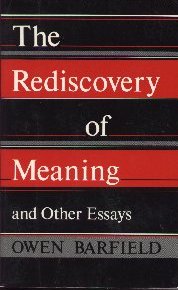
| Son of God, Son of Man |
For Barfield, of course, the relationship is not some theological perplexity but instrumental to the evolution of consciousness.
In "Self and Reality" Barfield expounds on this fulfillment. "Man is a being with a past relation and a future relation to God," he explains,Thus, at the final stage in the process of evolution and bringing it full circle, we awake to see the whole as an expression of the original polarity. We see realized as fact that polarity which, as dialectic, was found to constitute the nature of grammar and logic--the I AM in the act of reproducing itself. That which I AM has so long and laboriously created, itself affirms "I am." The Son of God awakes on earth and, awakened, names himself the Son of Man. (RCA 161)
Barfield, however, is not entirely sanguine about fulfillment of our divine potential: "We look like becoming, not the sons of God, but the husks of man" (RM 158).but he also has a present relation, which rhythmically links the two--which indeed is precisely that link. And this threefold relation to God is reflected everywhere in his being, in his psyche as for instance in his thinking and willing--with feeling between; in his physical structure; in his head and his limbs and lower organism--with, between them, the rhythms of his breathing and the circulation of his blood, which link and harmonize them. (RM 158)
| See in particular "The 'Son of God' and the 'Son of Man'" (RM 249-60) and "Philology and the Incarnation" (RM 228-36). |
1We must be
very careful, however, Barfield reminds, about what we mean when we speak
about "man" being created in God's image.
Rather he is a "descendent" by virtue of his descent, of his blood, of his history, of all that he carries in his organism of the past not of himself alone but of mankind as a whole, in a word because of his heredity. A fallen, a prodigal son, no doubt, but still a son. And this part of him is just the part of which he is normally unconscious. It is this part of him which is as much there when he is asleep as when he is awake, unlike his personality. I think it is because a very young baby is so largely unconscious-so that he has as yet no personality-that we feel so strongly the presence of the Divine when we look at him. Wordsworth knew something about that. (RM 251) |